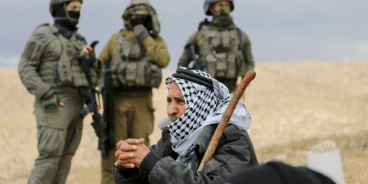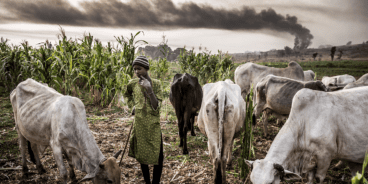
Atrocity Alert No. 143: Nigeria, South Sudan, Syria
Atrocity Alert is a weekly publication by the Global Centre for the Responsibility to Protect highlighting situations where populations are at risk of, or are enduring, mass atrocity crimes.
Postponed elections and inter-communal violence in Nigeria
At least 66 people, including 22 children, were killed in attacks on eight settlements in the Kajuru area of Kaduna State, northwest Nigeria. The killings reportedly took place between 10 and 12 February and are believed to be the result of ongoing conflict between members of the mainly Christian Adara and mainly Muslim Fulani ethnic groups. According to the police, six people have been arrested for alleged involvement in the attacks.
Separately, the Nigerian general elections that were scheduled for Saturday, 16 February, have been postponed for one week. On 15 February the Nigerian Independent National Electoral Commission (INEC) announced the delay “in the overall interest of our democracy.” The INEC cited logistical challenges as well as “what may well be attempts to sabotage our preparations,” including a spate of suspected arson attacks on INEC offices. On Twitter Nigeria’s President, Muhammadu Buhari, appealed to all Nigerians “to refrain from all civil disorder and remain peaceful, patriotic and united.”
Fearing a potential escalation of inter-religious and inter-communal violence, leaders from the Interfaith Dialogue Forum for Peace emphasized that the elections are not a religious matter and called for Nigerians to refrain from voting along religious lines. Meanwhile, ongoing attacks in the northeast of the country by armed extremist groups – including Boko Haram and the so-called Islamic State in West Africa – continue to pose a serious security challenge and could jeopardize the ability of people to vote.
Government authorities must ensure that the rescheduled elections can take place on 23 February and 9 March in a safe, free and transparent manner. The security of Nigeria’s 80 million voters must remain the preeminent priority and the government should increase police and military deployments to all vulnerable areas. Urgent efforts are also needed to deescalate tensions in Kaduna State where the government should increase support for community reconciliation programs in an effort to address the root causes of recurring inter-communal violence.
South Sudan plagued by sexual violence despite peace agreement
On 15 February the UN Mission in South Sudan (UNMISS) and the UN Office of the High Commissioner for Human Rights (OHCHR) issued a joint report documenting chronic levels of sexual violence in northern Unity State between September and December 2018. The investigation concluded that at least 134 women and girls were raped or gang raped, while 41 others suffered other forms of sexual and physical violence. Sixty-four of the reported cases involved girls, including some as young as eight years old.
On 20 February the UN Human Rights Council-mandated Commission on Human Rights in South Sudan also issued a report concluding that despite the 12 September signing of the Revitalized Agreement on the Resolution of the Conflict in the Republic of South Sudan (R-ARCSS), violations which may amount to war crimes and crimes against humanity continue.
The UNMISS/OHCHR investigation found that the sexual violence was mainly perpetrated by the pro-Taban Deng Sudan People’s Liberation Army in Opposition (SPLA-IO (TD)) and by government forces. UN High Commissioner for Human Rights Michelle Bachelet emphasized that “the volatility of the situation in South Sudan combined with the lack of accountability for violations and abuses committed throughout Unity, likely leads armed actors to believe that they can get away with rape and other horrific forms of sexual violence.”
The publication of these reports coincided with a renewed outbreak of hostilities in Yei River State. Since the beginning of February fighting has taken place between government forces and the National Salvation Front (NAS), an armed group that has refused to sign the R-ARCSS and is led by the former Deputy Chief of Staff of the Army, Thomas Cirillo. According to the UN Refugee Agency, approximately 5,000 people fled to the Democratic Republic of Congo to escape the violence and 14,000 people have been internally displaced. Both the NAS and government forces are accused of attacking civilians and looting villages.
While the R-ARCSS has generally decreased the level of violence across the country, all parties involved in the recent fighting in Yei River State must uphold their obligations to protect civilians and create an environment conducive to the full implementation of the peace agreement.
The South Sudanese authorities should also expeditiously investigate and prosecute all individuals responsible for sexual and gender-based crimes committed in Unity State, regardless of rank or political affiliation. It is essential that the government comprehensively address the culture of impunity that enables the ongoing perpetration of sexual and gender-based violence in South Sudan.
‘Normalization’ versus ‘Universal Jurisdiction’ as Syria’s civil war continues
At least 37 civilians were killed in Syria’s Idlib Governorate between 11 and 18 February as fighting continues in the country’s last remaining major opposition stronghold. Intensified bombardment by Syrian government forces and violence by armed opposition groups mean that millions of civilians are still at risk of displacement and death. In response to the deteriorating situation the UN High Commissioner for Human Rights, Michelle Bachelet, expressed concern for civilians who are “trapped between the escalation of hostilities and bombardment on the one hand, and, on the other, are forced to live under the extremist rule of Hay’at Tahrir Al-Sham and other extremist fighters who regularly carry out targeted killings, abductions and arbitrary detention.”
Despite the ongoing bloodshed, some states have taken steps toward normalizing their diplomatic relations with the Syrian government. In December both the United Arab Emirates and Bahrain reopened their embassies in Damascus. During the 20 January Arab Economic and Social Development Summit participants issued a statement that encouraged refugees to return to Syria despite the UN Refugee Agency (UNHCR) finding that conditions are not safe for repatriation. At least 5.7 million Syrian refugees remain displaced within the region.
It is essential that any repatriation of Syrian refugees is conducted on a strictly voluntary basis and in full cooperation with UNHCR. Similarly, without tangible progress toward an inclusive political process and a nationwide ceasefire, in accordance with UN Security Council Resolution 2254, the normalization of diplomatic relations with the government of Syria is both unacceptable and unconscionable.
Meanwhile, on 12 February three suspected former secret service officers from the Syrian government were arrested in Germany and France on allegations of torture and crimes against humanity. German authorities initiated the arrests under the principle of universal jurisdiction, which allows for the prosecution of crimes in one country even if they happened elsewhere. The arrests constitute a small but important blow to the impunity that has characterized the conflict in Syria. All those responsible for mass atrocities in Syria should be held accountable and punished in accordance with international law.
Related Publications


Atrocity Alert No. 445: Sudan, Syria and Eritrea
